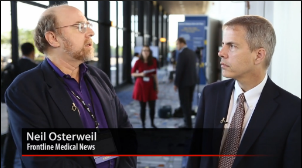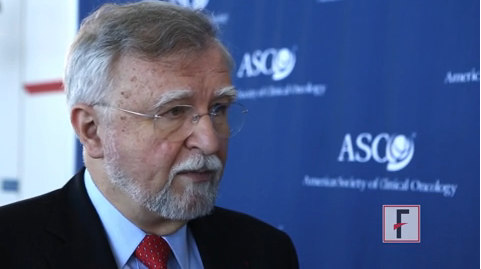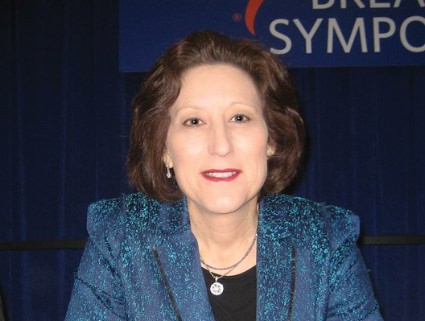User login
American Society of Clinical Oncology (ASCO): Annual Meeting
VIDEO: Ibrutinib boosts survival of relapsed/refractory CLL
CHICAGO – For the first time an oral drug, ibrutinib, has been shown to significantly improve both progression-free and overall survival of patients with relapsed or refractory chronic lymphocytic leukemia, compared with a systemic agent.
We interviewed lead author Dr. John Byrd about the first interim analysis from RESONATE, a phase III randomized trial, comparing ibrutinib with ofatumumab for the treatment of relapsed or refractory chronic lymphocytic leukemia or small lymphocytic lymphoma at the annual meeting of the American Society of Clinical Oncology. The analysis showed that 1-year overall survival for patients with previously treated chronic lymphocytic leukemia or small lymphocytic lymphoma assigned to receive ibrutinib (Imbruvica) was 90%, compared with 81% for patients assigned to ofatumumab (Arzerra).
Dr. Byrd is professor of medicine at the Ohio State University Comprehensive Cancer Center, Columbus. The study was supported by Pharmacyclics. Dr. Byrd disclosed receiving research funding and serving as an unpaid advisor to the company.
The video associated with this article is no longer available on this site. Please view all of our videos on the MDedge YouTube channel
CHICAGO – For the first time an oral drug, ibrutinib, has been shown to significantly improve both progression-free and overall survival of patients with relapsed or refractory chronic lymphocytic leukemia, compared with a systemic agent.
We interviewed lead author Dr. John Byrd about the first interim analysis from RESONATE, a phase III randomized trial, comparing ibrutinib with ofatumumab for the treatment of relapsed or refractory chronic lymphocytic leukemia or small lymphocytic lymphoma at the annual meeting of the American Society of Clinical Oncology. The analysis showed that 1-year overall survival for patients with previously treated chronic lymphocytic leukemia or small lymphocytic lymphoma assigned to receive ibrutinib (Imbruvica) was 90%, compared with 81% for patients assigned to ofatumumab (Arzerra).
Dr. Byrd is professor of medicine at the Ohio State University Comprehensive Cancer Center, Columbus. The study was supported by Pharmacyclics. Dr. Byrd disclosed receiving research funding and serving as an unpaid advisor to the company.
The video associated with this article is no longer available on this site. Please view all of our videos on the MDedge YouTube channel
CHICAGO – For the first time an oral drug, ibrutinib, has been shown to significantly improve both progression-free and overall survival of patients with relapsed or refractory chronic lymphocytic leukemia, compared with a systemic agent.
We interviewed lead author Dr. John Byrd about the first interim analysis from RESONATE, a phase III randomized trial, comparing ibrutinib with ofatumumab for the treatment of relapsed or refractory chronic lymphocytic leukemia or small lymphocytic lymphoma at the annual meeting of the American Society of Clinical Oncology. The analysis showed that 1-year overall survival for patients with previously treated chronic lymphocytic leukemia or small lymphocytic lymphoma assigned to receive ibrutinib (Imbruvica) was 90%, compared with 81% for patients assigned to ofatumumab (Arzerra).
Dr. Byrd is professor of medicine at the Ohio State University Comprehensive Cancer Center, Columbus. The study was supported by Pharmacyclics. Dr. Byrd disclosed receiving research funding and serving as an unpaid advisor to the company.
The video associated with this article is no longer available on this site. Please view all of our videos on the MDedge YouTube channel
AT THE ASCO ANNUAL MEETING 2014
VIDEO: Ramucirumab helps prolong advanced lung cancer survival
CHICAGO – Adding the recently approved stomach cancer drug, ramucirumab (Cyramza) to docetaxel reduced the risk of death in second-line, non–small cell lung cancer by 14% in the phase III REVEL study.
This is the first therapy in roughly a decade to improve the outcome of lung cancer patients in the second-line setting, according to study author Dr. Maurice Perol, head of thoracic oncology at Cancer Research Center of Lyon, France.
In addition, the recombinant human monoclonal antibody showed benefits in nonsquamous carcinoma as well as the squamous subtype, where treatments are limited.
Still, the median survival gain of just 1.4 months did not impress all at the annual meeting of the American Society of Clinical Oncology, where the study was highlighted in a press briefing before its formal presentation Monday June 2.
To hear Dr. Perol wade through the data and controversy, listen to our interview here.
The study was supported by ImClone, a subsidiary of Eli Lilly, which markets ramucirumab. Dr. Perol reported serving as a consultant or advisor with Lilly, Pfizer, Roche, Boehringer Ingelheim, and Genentech.
The video associated with this article is no longer available on this site. Please view all of our videos on the MDedge YouTube channel
CHICAGO – Adding the recently approved stomach cancer drug, ramucirumab (Cyramza) to docetaxel reduced the risk of death in second-line, non–small cell lung cancer by 14% in the phase III REVEL study.
This is the first therapy in roughly a decade to improve the outcome of lung cancer patients in the second-line setting, according to study author Dr. Maurice Perol, head of thoracic oncology at Cancer Research Center of Lyon, France.
In addition, the recombinant human monoclonal antibody showed benefits in nonsquamous carcinoma as well as the squamous subtype, where treatments are limited.
Still, the median survival gain of just 1.4 months did not impress all at the annual meeting of the American Society of Clinical Oncology, where the study was highlighted in a press briefing before its formal presentation Monday June 2.
To hear Dr. Perol wade through the data and controversy, listen to our interview here.
The study was supported by ImClone, a subsidiary of Eli Lilly, which markets ramucirumab. Dr. Perol reported serving as a consultant or advisor with Lilly, Pfizer, Roche, Boehringer Ingelheim, and Genentech.
The video associated with this article is no longer available on this site. Please view all of our videos on the MDedge YouTube channel
CHICAGO – Adding the recently approved stomach cancer drug, ramucirumab (Cyramza) to docetaxel reduced the risk of death in second-line, non–small cell lung cancer by 14% in the phase III REVEL study.
This is the first therapy in roughly a decade to improve the outcome of lung cancer patients in the second-line setting, according to study author Dr. Maurice Perol, head of thoracic oncology at Cancer Research Center of Lyon, France.
In addition, the recombinant human monoclonal antibody showed benefits in nonsquamous carcinoma as well as the squamous subtype, where treatments are limited.
Still, the median survival gain of just 1.4 months did not impress all at the annual meeting of the American Society of Clinical Oncology, where the study was highlighted in a press briefing before its formal presentation Monday June 2.
To hear Dr. Perol wade through the data and controversy, listen to our interview here.
The study was supported by ImClone, a subsidiary of Eli Lilly, which markets ramucirumab. Dr. Perol reported serving as a consultant or advisor with Lilly, Pfizer, Roche, Boehringer Ingelheim, and Genentech.
The video associated with this article is no longer available on this site. Please view all of our videos on the MDedge YouTube channel
AT THE ASCO ANNUAL MEETING 2014
Experimental lenvatinib extends PFS in iodine-refractory relapsed thyroid cancer
CHICAGO – The investigational drug lenvatinib significantly prolonged progression-free survival and produced high response rates compared with placebo in patients with iodine-refractory differentiated thyroid cancer.
In a randomized trial, the median progression-free survival (PFS) among patients assigned to lenvatinib was 18.3 months, compared with 3.6 months for placebo. The hazard ratio for lenvatinib was 0.21 (P less than .0001), Dr. Martin Schlumberger reported at the annual meeting of the American Society of Clinical Oncology.
"We had a high objective response rate – about 65% – with some complete responses. Interestingly, the time to objective response was only 2 months, so responses occur very quickly after the first treatment," Dr. Schlumberger, a professor of oncology at the University Paris-Sud, France, said at a media briefing prior to his presentation of the data in a plenary session.
"It’s really rewarding to see another active drug in this disease, where a year ago we really had no active therapy," commented Dr. Gregory A. Masters from the Helen F. Graham Cancer Center in Newark, Delaware.
Dr. Masters moderated the briefing but was not involved in the study.
Patients with relapsed or refractory differentiated thyroid cancer that is resistant to treatment with iodine-131 (131I) have few treatment choices and a 10-year survival rate of just 10%, Dr. Schlumberger noted.
There is evidence, however, showing that vascular endothelial growth factor (VEGF) signaling is associated with aggressive thyroid cancer and its propensity for metastasis, prompting researchers to explore VEGF-receptor inhibitors.
Lenvatinib is an oral multi–tyrosine kinase inhibitor of VEGF receptors 1-3, fibroblast growth factor receptors 1-4, platelet-derived growth factor receptor–alpha, and the RET and KIT kinases.
In a phase II study, the drug showed clinical activity against 131I-refractory differentiated thyroid cancer, prompting investigators to launch the phase III SELECT trial (Study of E7080 Lenvatinib in Differentiated Cancer of the Thyroid) in this population.
They enrolled 392 patients with measurable disease and evidence of progression within the previous 13 months of treatment, which could include one prior VEGF or VEGF-receptor inhibitor.
The patients were randomized on a 2:1 basis to either oral lenvatinib 24 mg daily or placebo, with treatment continuing until disease progression according to RECIST (Response Evaluation Criteria in Solid Tumor) criteria. At the time of confirmed disease progression, patients originally assigned to placebo could be crossed over to the active drug.
As noted above, median PFS was significantly better for the 261 patients assigned to lenvatinib, at 18.3 months, vs. 3.6 months for the 121 assigned to placebo. The median PFS for patients who had previously received another VEGF inhibitor was 15.1 months, compared with 18.7 months for those who had not been treated with an anti-VEGF agent (P value not shown). Median overall survival has not yet been reached.
The overall response rates were 65% for lenvatinib, versus 2% for placebo (P less than .0001). In the lenvatinib group, there were 4 complete responses, 165 partial responses, 40 cases with stable disease of at least 23 weeks’ duration, and 18 cases of progressive disease. Among placebo-treated patients, there were no complete responses, 2 partial responses, 39 cases of stable disease, and 52 of progressive disease. Only 1.5% of patients, all in the lenvatinib group, had a complete response, compared with none in the placebo group.
The median time to an objective response was 2 months. The median duration of response had not been reached by the last analysis. Approximately 75% of responders had an objective response last for more than 9.4 months, Dr. Schlumberger said.
As is common with other VEGF inhibitors, treatment-emergent adverse events were common, occurring in 97% of patients treated with lenvatinib, compared with 60% of patients on placebo.
The most common events were hypertension, occurring in 68% of patients vs. 9% on placebo, diarrhea (60% vs. 8%), fatigue/asthenia (59% vs. 28%), decreased appetite (50% vs. 12%), and nausea/vomiting (51% vs. 24%).
Adverse events requiring dose reductions occurred in 68% of patients on lenvatinib, dose interruptions in 82%, and discontinuation in 14%. In contrast, only 5% of patients on placebo had a dose reduction, 18% had an interruption, and 5% discontinued therapy.
Also of concern to investigators was the fact that of the 20 patients on lenvatinib who died during the trial, 6 of the deaths were determined by investigators to be treatment related. One of these patients died from a hemorrhagic stroke, one from a pulmonary embolism, and four from general health deterioration.
Hematologic complications are a class effect of the anti-VEGF tyrosine kinase inhibitors, said coauthor Dr. Lori Wirth, medical director of the center for head and neck cancers at Massachusetts General Hospital, Boston.
"The other thing about the toxicity profile overall is that it’s an extremely important thing to consider in patients with thyroid cancer, because many patients do have quite indolent disease. But the patients who were enrolled in the placebo arm had a progression-free survival of less than 4 months, and these are the people who go on to die from their disease when it’s that rapidly progressive. So we do need effective treatments that, unfortunately, do come with some toxicities," she said in an interview.
Although the toxicities of therapy were "considerable," most could be managed through either dose adjustment or additional medications, Dr. Schlumberger said.
The study was sponsored by Eisai. Dr. Schlumberger disclosed receiving honoraria and research funding and acting in an advisory role to the company. Dr. Masters and Dr. Wirth reported having no relevant relationships to disclose.
CHICAGO – The investigational drug lenvatinib significantly prolonged progression-free survival and produced high response rates compared with placebo in patients with iodine-refractory differentiated thyroid cancer.
In a randomized trial, the median progression-free survival (PFS) among patients assigned to lenvatinib was 18.3 months, compared with 3.6 months for placebo. The hazard ratio for lenvatinib was 0.21 (P less than .0001), Dr. Martin Schlumberger reported at the annual meeting of the American Society of Clinical Oncology.
"We had a high objective response rate – about 65% – with some complete responses. Interestingly, the time to objective response was only 2 months, so responses occur very quickly after the first treatment," Dr. Schlumberger, a professor of oncology at the University Paris-Sud, France, said at a media briefing prior to his presentation of the data in a plenary session.
"It’s really rewarding to see another active drug in this disease, where a year ago we really had no active therapy," commented Dr. Gregory A. Masters from the Helen F. Graham Cancer Center in Newark, Delaware.
Dr. Masters moderated the briefing but was not involved in the study.
Patients with relapsed or refractory differentiated thyroid cancer that is resistant to treatment with iodine-131 (131I) have few treatment choices and a 10-year survival rate of just 10%, Dr. Schlumberger noted.
There is evidence, however, showing that vascular endothelial growth factor (VEGF) signaling is associated with aggressive thyroid cancer and its propensity for metastasis, prompting researchers to explore VEGF-receptor inhibitors.
Lenvatinib is an oral multi–tyrosine kinase inhibitor of VEGF receptors 1-3, fibroblast growth factor receptors 1-4, platelet-derived growth factor receptor–alpha, and the RET and KIT kinases.
In a phase II study, the drug showed clinical activity against 131I-refractory differentiated thyroid cancer, prompting investigators to launch the phase III SELECT trial (Study of E7080 Lenvatinib in Differentiated Cancer of the Thyroid) in this population.
They enrolled 392 patients with measurable disease and evidence of progression within the previous 13 months of treatment, which could include one prior VEGF or VEGF-receptor inhibitor.
The patients were randomized on a 2:1 basis to either oral lenvatinib 24 mg daily or placebo, with treatment continuing until disease progression according to RECIST (Response Evaluation Criteria in Solid Tumor) criteria. At the time of confirmed disease progression, patients originally assigned to placebo could be crossed over to the active drug.
As noted above, median PFS was significantly better for the 261 patients assigned to lenvatinib, at 18.3 months, vs. 3.6 months for the 121 assigned to placebo. The median PFS for patients who had previously received another VEGF inhibitor was 15.1 months, compared with 18.7 months for those who had not been treated with an anti-VEGF agent (P value not shown). Median overall survival has not yet been reached.
The overall response rates were 65% for lenvatinib, versus 2% for placebo (P less than .0001). In the lenvatinib group, there were 4 complete responses, 165 partial responses, 40 cases with stable disease of at least 23 weeks’ duration, and 18 cases of progressive disease. Among placebo-treated patients, there were no complete responses, 2 partial responses, 39 cases of stable disease, and 52 of progressive disease. Only 1.5% of patients, all in the lenvatinib group, had a complete response, compared with none in the placebo group.
The median time to an objective response was 2 months. The median duration of response had not been reached by the last analysis. Approximately 75% of responders had an objective response last for more than 9.4 months, Dr. Schlumberger said.
As is common with other VEGF inhibitors, treatment-emergent adverse events were common, occurring in 97% of patients treated with lenvatinib, compared with 60% of patients on placebo.
The most common events were hypertension, occurring in 68% of patients vs. 9% on placebo, diarrhea (60% vs. 8%), fatigue/asthenia (59% vs. 28%), decreased appetite (50% vs. 12%), and nausea/vomiting (51% vs. 24%).
Adverse events requiring dose reductions occurred in 68% of patients on lenvatinib, dose interruptions in 82%, and discontinuation in 14%. In contrast, only 5% of patients on placebo had a dose reduction, 18% had an interruption, and 5% discontinued therapy.
Also of concern to investigators was the fact that of the 20 patients on lenvatinib who died during the trial, 6 of the deaths were determined by investigators to be treatment related. One of these patients died from a hemorrhagic stroke, one from a pulmonary embolism, and four from general health deterioration.
Hematologic complications are a class effect of the anti-VEGF tyrosine kinase inhibitors, said coauthor Dr. Lori Wirth, medical director of the center for head and neck cancers at Massachusetts General Hospital, Boston.
"The other thing about the toxicity profile overall is that it’s an extremely important thing to consider in patients with thyroid cancer, because many patients do have quite indolent disease. But the patients who were enrolled in the placebo arm had a progression-free survival of less than 4 months, and these are the people who go on to die from their disease when it’s that rapidly progressive. So we do need effective treatments that, unfortunately, do come with some toxicities," she said in an interview.
Although the toxicities of therapy were "considerable," most could be managed through either dose adjustment or additional medications, Dr. Schlumberger said.
The study was sponsored by Eisai. Dr. Schlumberger disclosed receiving honoraria and research funding and acting in an advisory role to the company. Dr. Masters and Dr. Wirth reported having no relevant relationships to disclose.
CHICAGO – The investigational drug lenvatinib significantly prolonged progression-free survival and produced high response rates compared with placebo in patients with iodine-refractory differentiated thyroid cancer.
In a randomized trial, the median progression-free survival (PFS) among patients assigned to lenvatinib was 18.3 months, compared with 3.6 months for placebo. The hazard ratio for lenvatinib was 0.21 (P less than .0001), Dr. Martin Schlumberger reported at the annual meeting of the American Society of Clinical Oncology.
"We had a high objective response rate – about 65% – with some complete responses. Interestingly, the time to objective response was only 2 months, so responses occur very quickly after the first treatment," Dr. Schlumberger, a professor of oncology at the University Paris-Sud, France, said at a media briefing prior to his presentation of the data in a plenary session.
"It’s really rewarding to see another active drug in this disease, where a year ago we really had no active therapy," commented Dr. Gregory A. Masters from the Helen F. Graham Cancer Center in Newark, Delaware.
Dr. Masters moderated the briefing but was not involved in the study.
Patients with relapsed or refractory differentiated thyroid cancer that is resistant to treatment with iodine-131 (131I) have few treatment choices and a 10-year survival rate of just 10%, Dr. Schlumberger noted.
There is evidence, however, showing that vascular endothelial growth factor (VEGF) signaling is associated with aggressive thyroid cancer and its propensity for metastasis, prompting researchers to explore VEGF-receptor inhibitors.
Lenvatinib is an oral multi–tyrosine kinase inhibitor of VEGF receptors 1-3, fibroblast growth factor receptors 1-4, platelet-derived growth factor receptor–alpha, and the RET and KIT kinases.
In a phase II study, the drug showed clinical activity against 131I-refractory differentiated thyroid cancer, prompting investigators to launch the phase III SELECT trial (Study of E7080 Lenvatinib in Differentiated Cancer of the Thyroid) in this population.
They enrolled 392 patients with measurable disease and evidence of progression within the previous 13 months of treatment, which could include one prior VEGF or VEGF-receptor inhibitor.
The patients were randomized on a 2:1 basis to either oral lenvatinib 24 mg daily or placebo, with treatment continuing until disease progression according to RECIST (Response Evaluation Criteria in Solid Tumor) criteria. At the time of confirmed disease progression, patients originally assigned to placebo could be crossed over to the active drug.
As noted above, median PFS was significantly better for the 261 patients assigned to lenvatinib, at 18.3 months, vs. 3.6 months for the 121 assigned to placebo. The median PFS for patients who had previously received another VEGF inhibitor was 15.1 months, compared with 18.7 months for those who had not been treated with an anti-VEGF agent (P value not shown). Median overall survival has not yet been reached.
The overall response rates were 65% for lenvatinib, versus 2% for placebo (P less than .0001). In the lenvatinib group, there were 4 complete responses, 165 partial responses, 40 cases with stable disease of at least 23 weeks’ duration, and 18 cases of progressive disease. Among placebo-treated patients, there were no complete responses, 2 partial responses, 39 cases of stable disease, and 52 of progressive disease. Only 1.5% of patients, all in the lenvatinib group, had a complete response, compared with none in the placebo group.
The median time to an objective response was 2 months. The median duration of response had not been reached by the last analysis. Approximately 75% of responders had an objective response last for more than 9.4 months, Dr. Schlumberger said.
As is common with other VEGF inhibitors, treatment-emergent adverse events were common, occurring in 97% of patients treated with lenvatinib, compared with 60% of patients on placebo.
The most common events were hypertension, occurring in 68% of patients vs. 9% on placebo, diarrhea (60% vs. 8%), fatigue/asthenia (59% vs. 28%), decreased appetite (50% vs. 12%), and nausea/vomiting (51% vs. 24%).
Adverse events requiring dose reductions occurred in 68% of patients on lenvatinib, dose interruptions in 82%, and discontinuation in 14%. In contrast, only 5% of patients on placebo had a dose reduction, 18% had an interruption, and 5% discontinued therapy.
Also of concern to investigators was the fact that of the 20 patients on lenvatinib who died during the trial, 6 of the deaths were determined by investigators to be treatment related. One of these patients died from a hemorrhagic stroke, one from a pulmonary embolism, and four from general health deterioration.
Hematologic complications are a class effect of the anti-VEGF tyrosine kinase inhibitors, said coauthor Dr. Lori Wirth, medical director of the center for head and neck cancers at Massachusetts General Hospital, Boston.
"The other thing about the toxicity profile overall is that it’s an extremely important thing to consider in patients with thyroid cancer, because many patients do have quite indolent disease. But the patients who were enrolled in the placebo arm had a progression-free survival of less than 4 months, and these are the people who go on to die from their disease when it’s that rapidly progressive. So we do need effective treatments that, unfortunately, do come with some toxicities," she said in an interview.
Although the toxicities of therapy were "considerable," most could be managed through either dose adjustment or additional medications, Dr. Schlumberger said.
The study was sponsored by Eisai. Dr. Schlumberger disclosed receiving honoraria and research funding and acting in an advisory role to the company. Dr. Masters and Dr. Wirth reported having no relevant relationships to disclose.
AT THE ASCO ANNUAL MEETING 2014
Key clinical finding: The investigational drug lenvatinib significantly prolonged progression-free survival and produced high response rates compared with placebo in patients with iodine-refractory differentiated thyroid cancer.
Major finding: Median progression-free survival for patients with relapsed iodine-refractory differentiated thyroid cancer was 18.3 months, compared with 3.6 months for patients on placebo.
Data source: Randomized, doubled-blind, placebo-controlled trial in 392 patients.
Disclosures: The study was sponsored by Eisai. Dr. Schlumberger disclosed receiving honoraria and research funding and acting in an advisory role to the company. Dr. Masters and Dr. Wirth reported having no relevant relationships to disclose.
Ibrutinib boosts survival of relapsed/refractory CLL
CHICAGO – For the first time an oral drug, ibrutinib, has been shown to significantly improve both progression-free and overall survival of patients with relapsed or refractory chronic lymphocytic leukemia, compared with a systemic agent.
The first interim analysis of a phase III randomized trial showed that 1-year overall survival for patients with previously treated chronic lymphocytic leukemia (CLL) or small lymphocytic lymphoma (SLL) assigned to receive ibrutinib (Imbruvica) was 90%, compared with 81% for patients assigned to ofatumumab (Arzerra).
The hazard ratio (HR) for death for patients assigned to ibrutinib was 0.43 (P = .005), reported lead author Dr. John Byrd, professor of medicine at the Ohio State University Comprehensive Cancer Center, Columbus, at a media briefing at the annual meeting of the American Society of Clinical Oncology.
The median time to progression for patients on ibrutinib had not been reached, compared with 8.08 months for those on ofatumumab. At 15 months follow-up, the median progression-free survival (PFS) was 8.4 months in the ofatumumab group vs. not reached for patients on ibrutinib.
Ibrutinib reduced by 78% the risk of disease progression or death, compared with ofatumumab, Dr. Byrd noted.
The overall survival advantage shown with ibrutinib persisted even after 57 patients who had disease progression while on ofatumumab were crossed over to ibrutinib, Dr. Byrd said.
"These patients who have a short response to first-line therapy, or who are elderly, have very few treatment options that induce durable remissions. Identifying new therapies in this patient population, particularly those that extend survival, is very important," he said.
"The issue now is how to best use the drug and how to most effectively move this into the front-line setting. This is a transformative drug," commented Dr. Olatoyosi Odenike, a leukemia specialist from the University of Chicago, who was not involved in the study.
Dr. Gregory A. Masters of Jefferson Medical College, Philadelphia, and the Helen F. Graham Cancer Center in Newark, Del., who moderated the briefing, but was not involved in the study, echoed those sentiments.
"I think this drug’s efficacy may in fact transform the treatment of CLL, potentially replacing more toxic chemotherapy," he said.
B-cell signaling inhibitor
Ibrutinib is an oral inhibitor of Bruton’s tyrosine kinase, an enzyme essential for B-cell receptor signaling and adhesion that is present in many types of B-cell malignancies. Based on the results of phase II studies, ibrutinib received Food and Drug Administration approval for relapsed mantle cell lymphoma in November 2013 and for CLL in February 2014.
Ofatumumab, a CD20 inhibitor, was approved for the treatment of CLL based on a single group study in which patients whose disease was resistant to fludarabine and alemtuzumab had an overall response rate of 58%.
In the RESONATE trial, Dr. Byrd and his colleagues enrolled 391 patients with relapsed or refractory CLL or SLL and randomly assigned them to receive either oral ibrutinib 420 mg once daily until disease progression or unacceptable toxicity (195 patients) or to IV ofatumumab at an initial dose of 300 mg followed by 11 doses at 2,000 mg (196 patients).
At a median follow-up of 9.4 months, the median duration of PFS, the primary endpoint, had not been reached in ibrutinib-treated patients (88% of whom had PFS at 6 months), compared with 8.1 months for patients treated with ofatumumab.
In all, 42.6% of patients on ibrutinib had a partial response rate, compared with 4.1% of those on ofatumumab. In addition, 20% of patients on ibrutinib had a partial response with lymphocytosis. Lymphocytosis occurred in 69% of all patients treated with ibrutinib. The investigators did not consider lymphocytosis to be disease progression, and the condition resolved in 77% of these patients during follow-up.
Nonhematologic adverse events occurring in at least 20% of patients included diarrhea, fatigue, pyrexia, and nausea in patients on ibrutinib, and fatigue, infusion-related reactions, and cough in those on ofatumumab.
In all, 4% of patients on ibrutinib and 5% on ofatumumab discontinued the assigned drug because of adverse events.
Richter’s transformation – CLL evolving into an aggressive, rapidly growing large-cell lymphoma – occurred in two patients in each treatment arm. One patient on ibrutinib developed prolymphocytic leukemia.
Dr. Byrd noted that the improved PFS, overall survival, and response rates with ibrutinib were seem across all patient subgroups, including patients who were resistant to chemoimmunotherapy and those with the notorious chromosome 17p13.1 deletion.
Ibrutinib is currently being explored in patients with previously untreated CLL or SLL. The study was supported by Pharmacyclics. Dr. Byrd disclosed receiving research funding and serving as an unpaid advisor to the company. Dr. Odenike and Dr. Masters reported having no relevant disclosures.
CHICAGO – For the first time an oral drug, ibrutinib, has been shown to significantly improve both progression-free and overall survival of patients with relapsed or refractory chronic lymphocytic leukemia, compared with a systemic agent.
The first interim analysis of a phase III randomized trial showed that 1-year overall survival for patients with previously treated chronic lymphocytic leukemia (CLL) or small lymphocytic lymphoma (SLL) assigned to receive ibrutinib (Imbruvica) was 90%, compared with 81% for patients assigned to ofatumumab (Arzerra).
The hazard ratio (HR) for death for patients assigned to ibrutinib was 0.43 (P = .005), reported lead author Dr. John Byrd, professor of medicine at the Ohio State University Comprehensive Cancer Center, Columbus, at a media briefing at the annual meeting of the American Society of Clinical Oncology.
The median time to progression for patients on ibrutinib had not been reached, compared with 8.08 months for those on ofatumumab. At 15 months follow-up, the median progression-free survival (PFS) was 8.4 months in the ofatumumab group vs. not reached for patients on ibrutinib.
Ibrutinib reduced by 78% the risk of disease progression or death, compared with ofatumumab, Dr. Byrd noted.
The overall survival advantage shown with ibrutinib persisted even after 57 patients who had disease progression while on ofatumumab were crossed over to ibrutinib, Dr. Byrd said.
"These patients who have a short response to first-line therapy, or who are elderly, have very few treatment options that induce durable remissions. Identifying new therapies in this patient population, particularly those that extend survival, is very important," he said.
"The issue now is how to best use the drug and how to most effectively move this into the front-line setting. This is a transformative drug," commented Dr. Olatoyosi Odenike, a leukemia specialist from the University of Chicago, who was not involved in the study.
Dr. Gregory A. Masters of Jefferson Medical College, Philadelphia, and the Helen F. Graham Cancer Center in Newark, Del., who moderated the briefing, but was not involved in the study, echoed those sentiments.
"I think this drug’s efficacy may in fact transform the treatment of CLL, potentially replacing more toxic chemotherapy," he said.
B-cell signaling inhibitor
Ibrutinib is an oral inhibitor of Bruton’s tyrosine kinase, an enzyme essential for B-cell receptor signaling and adhesion that is present in many types of B-cell malignancies. Based on the results of phase II studies, ibrutinib received Food and Drug Administration approval for relapsed mantle cell lymphoma in November 2013 and for CLL in February 2014.
Ofatumumab, a CD20 inhibitor, was approved for the treatment of CLL based on a single group study in which patients whose disease was resistant to fludarabine and alemtuzumab had an overall response rate of 58%.
In the RESONATE trial, Dr. Byrd and his colleagues enrolled 391 patients with relapsed or refractory CLL or SLL and randomly assigned them to receive either oral ibrutinib 420 mg once daily until disease progression or unacceptable toxicity (195 patients) or to IV ofatumumab at an initial dose of 300 mg followed by 11 doses at 2,000 mg (196 patients).
At a median follow-up of 9.4 months, the median duration of PFS, the primary endpoint, had not been reached in ibrutinib-treated patients (88% of whom had PFS at 6 months), compared with 8.1 months for patients treated with ofatumumab.
In all, 42.6% of patients on ibrutinib had a partial response rate, compared with 4.1% of those on ofatumumab. In addition, 20% of patients on ibrutinib had a partial response with lymphocytosis. Lymphocytosis occurred in 69% of all patients treated with ibrutinib. The investigators did not consider lymphocytosis to be disease progression, and the condition resolved in 77% of these patients during follow-up.
Nonhematologic adverse events occurring in at least 20% of patients included diarrhea, fatigue, pyrexia, and nausea in patients on ibrutinib, and fatigue, infusion-related reactions, and cough in those on ofatumumab.
In all, 4% of patients on ibrutinib and 5% on ofatumumab discontinued the assigned drug because of adverse events.
Richter’s transformation – CLL evolving into an aggressive, rapidly growing large-cell lymphoma – occurred in two patients in each treatment arm. One patient on ibrutinib developed prolymphocytic leukemia.
Dr. Byrd noted that the improved PFS, overall survival, and response rates with ibrutinib were seem across all patient subgroups, including patients who were resistant to chemoimmunotherapy and those with the notorious chromosome 17p13.1 deletion.
Ibrutinib is currently being explored in patients with previously untreated CLL or SLL. The study was supported by Pharmacyclics. Dr. Byrd disclosed receiving research funding and serving as an unpaid advisor to the company. Dr. Odenike and Dr. Masters reported having no relevant disclosures.
CHICAGO – For the first time an oral drug, ibrutinib, has been shown to significantly improve both progression-free and overall survival of patients with relapsed or refractory chronic lymphocytic leukemia, compared with a systemic agent.
The first interim analysis of a phase III randomized trial showed that 1-year overall survival for patients with previously treated chronic lymphocytic leukemia (CLL) or small lymphocytic lymphoma (SLL) assigned to receive ibrutinib (Imbruvica) was 90%, compared with 81% for patients assigned to ofatumumab (Arzerra).
The hazard ratio (HR) for death for patients assigned to ibrutinib was 0.43 (P = .005), reported lead author Dr. John Byrd, professor of medicine at the Ohio State University Comprehensive Cancer Center, Columbus, at a media briefing at the annual meeting of the American Society of Clinical Oncology.
The median time to progression for patients on ibrutinib had not been reached, compared with 8.08 months for those on ofatumumab. At 15 months follow-up, the median progression-free survival (PFS) was 8.4 months in the ofatumumab group vs. not reached for patients on ibrutinib.
Ibrutinib reduced by 78% the risk of disease progression or death, compared with ofatumumab, Dr. Byrd noted.
The overall survival advantage shown with ibrutinib persisted even after 57 patients who had disease progression while on ofatumumab were crossed over to ibrutinib, Dr. Byrd said.
"These patients who have a short response to first-line therapy, or who are elderly, have very few treatment options that induce durable remissions. Identifying new therapies in this patient population, particularly those that extend survival, is very important," he said.
"The issue now is how to best use the drug and how to most effectively move this into the front-line setting. This is a transformative drug," commented Dr. Olatoyosi Odenike, a leukemia specialist from the University of Chicago, who was not involved in the study.
Dr. Gregory A. Masters of Jefferson Medical College, Philadelphia, and the Helen F. Graham Cancer Center in Newark, Del., who moderated the briefing, but was not involved in the study, echoed those sentiments.
"I think this drug’s efficacy may in fact transform the treatment of CLL, potentially replacing more toxic chemotherapy," he said.
B-cell signaling inhibitor
Ibrutinib is an oral inhibitor of Bruton’s tyrosine kinase, an enzyme essential for B-cell receptor signaling and adhesion that is present in many types of B-cell malignancies. Based on the results of phase II studies, ibrutinib received Food and Drug Administration approval for relapsed mantle cell lymphoma in November 2013 and for CLL in February 2014.
Ofatumumab, a CD20 inhibitor, was approved for the treatment of CLL based on a single group study in which patients whose disease was resistant to fludarabine and alemtuzumab had an overall response rate of 58%.
In the RESONATE trial, Dr. Byrd and his colleagues enrolled 391 patients with relapsed or refractory CLL or SLL and randomly assigned them to receive either oral ibrutinib 420 mg once daily until disease progression or unacceptable toxicity (195 patients) or to IV ofatumumab at an initial dose of 300 mg followed by 11 doses at 2,000 mg (196 patients).
At a median follow-up of 9.4 months, the median duration of PFS, the primary endpoint, had not been reached in ibrutinib-treated patients (88% of whom had PFS at 6 months), compared with 8.1 months for patients treated with ofatumumab.
In all, 42.6% of patients on ibrutinib had a partial response rate, compared with 4.1% of those on ofatumumab. In addition, 20% of patients on ibrutinib had a partial response with lymphocytosis. Lymphocytosis occurred in 69% of all patients treated with ibrutinib. The investigators did not consider lymphocytosis to be disease progression, and the condition resolved in 77% of these patients during follow-up.
Nonhematologic adverse events occurring in at least 20% of patients included diarrhea, fatigue, pyrexia, and nausea in patients on ibrutinib, and fatigue, infusion-related reactions, and cough in those on ofatumumab.
In all, 4% of patients on ibrutinib and 5% on ofatumumab discontinued the assigned drug because of adverse events.
Richter’s transformation – CLL evolving into an aggressive, rapidly growing large-cell lymphoma – occurred in two patients in each treatment arm. One patient on ibrutinib developed prolymphocytic leukemia.
Dr. Byrd noted that the improved PFS, overall survival, and response rates with ibrutinib were seem across all patient subgroups, including patients who were resistant to chemoimmunotherapy and those with the notorious chromosome 17p13.1 deletion.
Ibrutinib is currently being explored in patients with previously untreated CLL or SLL. The study was supported by Pharmacyclics. Dr. Byrd disclosed receiving research funding and serving as an unpaid advisor to the company. Dr. Odenike and Dr. Masters reported having no relevant disclosures.
AT THE ASCO ANNUAL MEETING 2014
Major finding: One-year overall survival for patients with previously treated chronic lymphocytic leukemia (CLL) or small lymphocytic lymphoma (SLL) treated with ibrutinib was 90%, compared with 81% for patients treated with ofatumumab.
Data source: First interim analysis of a randomized phase III study in 391 patients with relapsed or refractory chronic lymphocytic leukemia or small lymphocytic lymphoma.
Disclosures: The study was supported by Pharmacyclics. Dr. Byrd disclosed receiving research funding and serving as an unpaid advisor to the company. Dr. Odenike and Dr. Masters reported having no relevant disclosures.
VIDEO: Less frequent zoledronic acid is safe, retains efficacy
CHICAGO – Women with breast cancer and bone metastasis can safely scale back the frequency of their zoledronic acid infusions from every 4 weeks to every 12 weeks without a loss in efficacy*, according to results of the phase III OPTIMIZE 2 trial.
Notably, the dreaded bisphosphonate side effect of osteonecrosis of the jaw was seen in two patients in the monthly arm, but none of those in the every-3-month treatment arm.
The findings apply only to breast cancer patients who’ve completed at least 1 year of monthly zoledronic acid therapy, according to study author Dr. Gabriel N. Hortobagyi, a professor of medicine at the University of Texas M.D. Anderson Cancer Center, Houston.
In an interview with us at the 50th anniversary of the American Society of Clinical Oncology, this past ASCO president said that the findings from this late-breaking abstract study will have implications for the costs of cancer care and possibly for patients with other cancers.
Dr. Hortobagyi reported consultant or advisory roles and research funding with Novartis, the study sponsor. Several coauthors are employees of or have leadership positions with Novartis.
The video associated with this article is no longer available on this site. Please view all of our videos on the MDedge YouTube channel
Correction, 5/31/2014: An earlier version of this article misstated the duration of their zoledronic acid infusion treatments.
CHICAGO – Women with breast cancer and bone metastasis can safely scale back the frequency of their zoledronic acid infusions from every 4 weeks to every 12 weeks without a loss in efficacy*, according to results of the phase III OPTIMIZE 2 trial.
Notably, the dreaded bisphosphonate side effect of osteonecrosis of the jaw was seen in two patients in the monthly arm, but none of those in the every-3-month treatment arm.
The findings apply only to breast cancer patients who’ve completed at least 1 year of monthly zoledronic acid therapy, according to study author Dr. Gabriel N. Hortobagyi, a professor of medicine at the University of Texas M.D. Anderson Cancer Center, Houston.
In an interview with us at the 50th anniversary of the American Society of Clinical Oncology, this past ASCO president said that the findings from this late-breaking abstract study will have implications for the costs of cancer care and possibly for patients with other cancers.
Dr. Hortobagyi reported consultant or advisory roles and research funding with Novartis, the study sponsor. Several coauthors are employees of or have leadership positions with Novartis.
The video associated with this article is no longer available on this site. Please view all of our videos on the MDedge YouTube channel
Correction, 5/31/2014: An earlier version of this article misstated the duration of their zoledronic acid infusion treatments.
CHICAGO – Women with breast cancer and bone metastasis can safely scale back the frequency of their zoledronic acid infusions from every 4 weeks to every 12 weeks without a loss in efficacy*, according to results of the phase III OPTIMIZE 2 trial.
Notably, the dreaded bisphosphonate side effect of osteonecrosis of the jaw was seen in two patients in the monthly arm, but none of those in the every-3-month treatment arm.
The findings apply only to breast cancer patients who’ve completed at least 1 year of monthly zoledronic acid therapy, according to study author Dr. Gabriel N. Hortobagyi, a professor of medicine at the University of Texas M.D. Anderson Cancer Center, Houston.
In an interview with us at the 50th anniversary of the American Society of Clinical Oncology, this past ASCO president said that the findings from this late-breaking abstract study will have implications for the costs of cancer care and possibly for patients with other cancers.
Dr. Hortobagyi reported consultant or advisory roles and research funding with Novartis, the study sponsor. Several coauthors are employees of or have leadership positions with Novartis.
The video associated with this article is no longer available on this site. Please view all of our videos on the MDedge YouTube channel
Correction, 5/31/2014: An earlier version of this article misstated the duration of their zoledronic acid infusion treatments.
AT THE ASCO ANNUAL MEETING 2014
ASCO 2014: Dr. Walter M. Stadler gives his top picks in genitourinary research
1. Abstract LBA2, Christopher Sweeney et al.
Impact on overall survival (OS) with chemohormonal therapy versus hormonal therapy for hormone-sensitive newly metastatic prostate cancer (mPrCa): An ECOG-led phase III randomized trial.
http://abstracts.asco.org/144/AbstView_144_127755.html
2. Abstract 5012, Toni K. Choueiri et al.
Immunomodulatory activity of nivolumab in previously treated and untreated metastatic renal cell carcinoma (mRCC): Biomarker-based results from a randomized clinical trial.
http://abstracts.asco.org/144/AbstView_144_125914.html
3. Abstract 4504, Hans J. Hammers et al.
Phase I study of nivolumab in combination with ipilimumab in metastatic renal cell carcinoma (mRCC).
http://abstracts.asco.org/144/AbstView_144_129458.html
4. Abstract 5003, Xabier Garcia-Albeniz et al.
Immediate versus deferred initiation of androgen deprivation therapy in prostate cancer patients with PSA-only relapse.
http://abstracts.asco.org/144/AbstView_144_131550.html
Oncology Practice covered this study from a premeeting press briefing.
5. Abstract 5007, Andrew J. Armstrong et al.
Primary, secondary, and quality-of-life endpoint results from PREVAIL, a phase 3 study of enzalutamide in men with metastatic, castration-resistant prostate cancer (mCRPC).
http://abstracts.asco.org/144/AbstView_144_127316.html
Dr. Walter M. Stadler is the Fred C. Buffett Professor of Medicine and Surgery; associate dean for clinical research; chief, section of hematology/oncology; and director, genitourinary program, University of Chicago.
1. Abstract LBA2, Christopher Sweeney et al.
Impact on overall survival (OS) with chemohormonal therapy versus hormonal therapy for hormone-sensitive newly metastatic prostate cancer (mPrCa): An ECOG-led phase III randomized trial.
http://abstracts.asco.org/144/AbstView_144_127755.html
2. Abstract 5012, Toni K. Choueiri et al.
Immunomodulatory activity of nivolumab in previously treated and untreated metastatic renal cell carcinoma (mRCC): Biomarker-based results from a randomized clinical trial.
http://abstracts.asco.org/144/AbstView_144_125914.html
3. Abstract 4504, Hans J. Hammers et al.
Phase I study of nivolumab in combination with ipilimumab in metastatic renal cell carcinoma (mRCC).
http://abstracts.asco.org/144/AbstView_144_129458.html
4. Abstract 5003, Xabier Garcia-Albeniz et al.
Immediate versus deferred initiation of androgen deprivation therapy in prostate cancer patients with PSA-only relapse.
http://abstracts.asco.org/144/AbstView_144_131550.html
Oncology Practice covered this study from a premeeting press briefing.
5. Abstract 5007, Andrew J. Armstrong et al.
Primary, secondary, and quality-of-life endpoint results from PREVAIL, a phase 3 study of enzalutamide in men with metastatic, castration-resistant prostate cancer (mCRPC).
http://abstracts.asco.org/144/AbstView_144_127316.html
Dr. Walter M. Stadler is the Fred C. Buffett Professor of Medicine and Surgery; associate dean for clinical research; chief, section of hematology/oncology; and director, genitourinary program, University of Chicago.
1. Abstract LBA2, Christopher Sweeney et al.
Impact on overall survival (OS) with chemohormonal therapy versus hormonal therapy for hormone-sensitive newly metastatic prostate cancer (mPrCa): An ECOG-led phase III randomized trial.
http://abstracts.asco.org/144/AbstView_144_127755.html
2. Abstract 5012, Toni K. Choueiri et al.
Immunomodulatory activity of nivolumab in previously treated and untreated metastatic renal cell carcinoma (mRCC): Biomarker-based results from a randomized clinical trial.
http://abstracts.asco.org/144/AbstView_144_125914.html
3. Abstract 4504, Hans J. Hammers et al.
Phase I study of nivolumab in combination with ipilimumab in metastatic renal cell carcinoma (mRCC).
http://abstracts.asco.org/144/AbstView_144_129458.html
4. Abstract 5003, Xabier Garcia-Albeniz et al.
Immediate versus deferred initiation of androgen deprivation therapy in prostate cancer patients with PSA-only relapse.
http://abstracts.asco.org/144/AbstView_144_131550.html
Oncology Practice covered this study from a premeeting press briefing.
5. Abstract 5007, Andrew J. Armstrong et al.
Primary, secondary, and quality-of-life endpoint results from PREVAIL, a phase 3 study of enzalutamide in men with metastatic, castration-resistant prostate cancer (mCRPC).
http://abstracts.asco.org/144/AbstView_144_127316.html
Dr. Walter M. Stadler is the Fred C. Buffett Professor of Medicine and Surgery; associate dean for clinical research; chief, section of hematology/oncology; and director, genitourinary program, University of Chicago.
FROM THE ASCO ANNUAL MEETING 2014
ASCO 2014: Dr. Jeffrey A. Sosman gives his top picks in melanoma research
1. Abstract LBA 9000, Antoni Ribas et al.
Efficacy and safety of the anti-PD-1 monoclonal antibody MK-3475 in 411 patients (pts) with melanoma (MEL).
http://abstracts.asco.org/144/AbstView_144_133842.html
2. Abstract LBA 9008, Alexander M. Eggermont et al. Ipilimumab versus placebo after complete resection of stage III melanoma: Initial efficacy and safety results from the EORTC 18071 phase III trial.
http://abstracts.asco.org/144/AbstView_144_130118.html
3. Abstract 9011, Georgina V. Long et al.
COMBI-d: A randomized, double-blinded, phase III study comparing the combination of dabrafenib and trametinib to dabrafenib and trametinib placebo as first-line therapy in patients (pts) with unresectable or metastatic BRAFV600E/K mutation-positive cutaneous melanoma.
http://abstracts.asco.org/144/AbstView_144_128598.html
4. Abstract 9008a, Howard L. Kaufman et al.
Primary overall survival (OS) from OPTiM, a randomized phase III trial of talimogene laherparepvec (T-VEC) versus subcutaneous (SC) granulocyte-macrophage colony-stimulating factor (GM-CSF) for the treatment (tx) of unresected stage IIIB/C and IV melanoma.
http://abstracts.asco.org/144/AbstView_144_133898.html
5. Abstract 9010, Keith Flaherty et al.
Updated overall survival (OS) for BRF113220, a phase 1-2 study of dabrafenib (D) alone versus combined dabrafenib and trametinib (D+T) in pts with BRAF V600 mutation-positive (+) metastatic melanoma (MM).
http://abstracts.asco.org/144/AbstView_144_134903.html
Dr. Jeffrey A. Sosman is professor of medicine and Ingram Professor for Cancer Research, Vanderbilt University Medical Center, Nashville, Tenn.
1. Abstract LBA 9000, Antoni Ribas et al.
Efficacy and safety of the anti-PD-1 monoclonal antibody MK-3475 in 411 patients (pts) with melanoma (MEL).
http://abstracts.asco.org/144/AbstView_144_133842.html
2. Abstract LBA 9008, Alexander M. Eggermont et al. Ipilimumab versus placebo after complete resection of stage III melanoma: Initial efficacy and safety results from the EORTC 18071 phase III trial.
http://abstracts.asco.org/144/AbstView_144_130118.html
3. Abstract 9011, Georgina V. Long et al.
COMBI-d: A randomized, double-blinded, phase III study comparing the combination of dabrafenib and trametinib to dabrafenib and trametinib placebo as first-line therapy in patients (pts) with unresectable or metastatic BRAFV600E/K mutation-positive cutaneous melanoma.
http://abstracts.asco.org/144/AbstView_144_128598.html
4. Abstract 9008a, Howard L. Kaufman et al.
Primary overall survival (OS) from OPTiM, a randomized phase III trial of talimogene laherparepvec (T-VEC) versus subcutaneous (SC) granulocyte-macrophage colony-stimulating factor (GM-CSF) for the treatment (tx) of unresected stage IIIB/C and IV melanoma.
http://abstracts.asco.org/144/AbstView_144_133898.html
5. Abstract 9010, Keith Flaherty et al.
Updated overall survival (OS) for BRF113220, a phase 1-2 study of dabrafenib (D) alone versus combined dabrafenib and trametinib (D+T) in pts with BRAF V600 mutation-positive (+) metastatic melanoma (MM).
http://abstracts.asco.org/144/AbstView_144_134903.html
Dr. Jeffrey A. Sosman is professor of medicine and Ingram Professor for Cancer Research, Vanderbilt University Medical Center, Nashville, Tenn.
1. Abstract LBA 9000, Antoni Ribas et al.
Efficacy and safety of the anti-PD-1 monoclonal antibody MK-3475 in 411 patients (pts) with melanoma (MEL).
http://abstracts.asco.org/144/AbstView_144_133842.html
2. Abstract LBA 9008, Alexander M. Eggermont et al. Ipilimumab versus placebo after complete resection of stage III melanoma: Initial efficacy and safety results from the EORTC 18071 phase III trial.
http://abstracts.asco.org/144/AbstView_144_130118.html
3. Abstract 9011, Georgina V. Long et al.
COMBI-d: A randomized, double-blinded, phase III study comparing the combination of dabrafenib and trametinib to dabrafenib and trametinib placebo as first-line therapy in patients (pts) with unresectable or metastatic BRAFV600E/K mutation-positive cutaneous melanoma.
http://abstracts.asco.org/144/AbstView_144_128598.html
4. Abstract 9008a, Howard L. Kaufman et al.
Primary overall survival (OS) from OPTiM, a randomized phase III trial of talimogene laherparepvec (T-VEC) versus subcutaneous (SC) granulocyte-macrophage colony-stimulating factor (GM-CSF) for the treatment (tx) of unresected stage IIIB/C and IV melanoma.
http://abstracts.asco.org/144/AbstView_144_133898.html
5. Abstract 9010, Keith Flaherty et al.
Updated overall survival (OS) for BRF113220, a phase 1-2 study of dabrafenib (D) alone versus combined dabrafenib and trametinib (D+T) in pts with BRAF V600 mutation-positive (+) metastatic melanoma (MM).
http://abstracts.asco.org/144/AbstView_144_134903.html
Dr. Jeffrey A. Sosman is professor of medicine and Ingram Professor for Cancer Research, Vanderbilt University Medical Center, Nashville, Tenn.
FROM THE ASCO ANNUAL MEETING 2014
ASCO 2014: Dr. Johanna C. Bendell gives her top picks in gastrointestinal research
1. Abstract LBA3, Alan P. Venook et al.
CALGB/SWOG 80405: Phase III trial of irinotecan/5-FU/leucovorin (FOLFIRI) or oxaliplatin/5-FU/leucovorin (mFOLFOX6) with bevacizumab (BV) or cetuximab (CET) for patients (pts) with KRAS wild-type (wt) untreated metastatic adenocarcinoma of the colon or rectum (MCRC).
http://abstracts.asco.org/144/AbstView_144_126013.html
2. Abstract 3503, Dirk Arnold et al.
Maintenance strategy with fluoropyrimidines (FP) plus bevacizumab (Bev), Bev alone, or no treatment, following a standard combination of FP, oxaliplatin (Ox), and Bev as first-line treatment for patients with metastatic colorectal cancer (mCRC): A phase III non-inferiority trial (AIO KRK 0207).
http://abstracts.asco.org/144/AbstView_144_133066.html
3. Abstract 3504, Miriam Koopman et al.
Final results and subgroup analyses of the phase 3 CAIRO3 study: Maintenance treatment with capecitabine + bevacizumab versus observation after induction treatment with chemotherapy + bevacizumab in metastatic colorectal cancer (mCRC).
http://abstracts.asco.org/144/AbstView_144_131325.html
4. Abstract 3506, Fortunato Ciardiello et al.
Treatment outcome according to tumor RAS mutation status in CRYSTAL study patients with metastatic colorectal cancer (mCRC) randomized to FOLFIRI with/without cetuximab.
http://abstracts.asco.org/144/AbstView_144_127862.html
5. Abstract 4005, Shuichi Hironaha et al.
RAINBOW: A global, phase III, randomized, double-blind study of ramucirumab (RAM) plus paclitaxel (PTX) versus placebo (PL) plus PTX in the treatment of metastatic gastroesophageal junction and gastric adenocarcinoma (mGC) following disease progression on first-line platinum- and fluoropyrimidine-containing combination therapy – Efficacy analysis in Japanese and Western patients.
http://abstracts.asco.org/144/AbstView_144_132412.html
6. Abstract 4000, Herbert Hurwitz et al.
RECAP: A randomized double-blind phase 2 study of ruxolitinib (RUX) or placebo (PBO) with capecitabine (CAPE) as second-line therapy in patients (pts) with metastatic pancreatic cancer (mPC).
http://abstracts.asco.org/144/AbstView_144_128761.html
Dr. Johanna C. Bendell is the director of GI cancer research and associate director of the drug development unit at the Sarah Cannon Research Institute, Nashville, Tenn.
1. Abstract LBA3, Alan P. Venook et al.
CALGB/SWOG 80405: Phase III trial of irinotecan/5-FU/leucovorin (FOLFIRI) or oxaliplatin/5-FU/leucovorin (mFOLFOX6) with bevacizumab (BV) or cetuximab (CET) for patients (pts) with KRAS wild-type (wt) untreated metastatic adenocarcinoma of the colon or rectum (MCRC).
http://abstracts.asco.org/144/AbstView_144_126013.html
2. Abstract 3503, Dirk Arnold et al.
Maintenance strategy with fluoropyrimidines (FP) plus bevacizumab (Bev), Bev alone, or no treatment, following a standard combination of FP, oxaliplatin (Ox), and Bev as first-line treatment for patients with metastatic colorectal cancer (mCRC): A phase III non-inferiority trial (AIO KRK 0207).
http://abstracts.asco.org/144/AbstView_144_133066.html
3. Abstract 3504, Miriam Koopman et al.
Final results and subgroup analyses of the phase 3 CAIRO3 study: Maintenance treatment with capecitabine + bevacizumab versus observation after induction treatment with chemotherapy + bevacizumab in metastatic colorectal cancer (mCRC).
http://abstracts.asco.org/144/AbstView_144_131325.html
4. Abstract 3506, Fortunato Ciardiello et al.
Treatment outcome according to tumor RAS mutation status in CRYSTAL study patients with metastatic colorectal cancer (mCRC) randomized to FOLFIRI with/without cetuximab.
http://abstracts.asco.org/144/AbstView_144_127862.html
5. Abstract 4005, Shuichi Hironaha et al.
RAINBOW: A global, phase III, randomized, double-blind study of ramucirumab (RAM) plus paclitaxel (PTX) versus placebo (PL) plus PTX in the treatment of metastatic gastroesophageal junction and gastric adenocarcinoma (mGC) following disease progression on first-line platinum- and fluoropyrimidine-containing combination therapy – Efficacy analysis in Japanese and Western patients.
http://abstracts.asco.org/144/AbstView_144_132412.html
6. Abstract 4000, Herbert Hurwitz et al.
RECAP: A randomized double-blind phase 2 study of ruxolitinib (RUX) or placebo (PBO) with capecitabine (CAPE) as second-line therapy in patients (pts) with metastatic pancreatic cancer (mPC).
http://abstracts.asco.org/144/AbstView_144_128761.html
Dr. Johanna C. Bendell is the director of GI cancer research and associate director of the drug development unit at the Sarah Cannon Research Institute, Nashville, Tenn.
1. Abstract LBA3, Alan P. Venook et al.
CALGB/SWOG 80405: Phase III trial of irinotecan/5-FU/leucovorin (FOLFIRI) or oxaliplatin/5-FU/leucovorin (mFOLFOX6) with bevacizumab (BV) or cetuximab (CET) for patients (pts) with KRAS wild-type (wt) untreated metastatic adenocarcinoma of the colon or rectum (MCRC).
http://abstracts.asco.org/144/AbstView_144_126013.html
2. Abstract 3503, Dirk Arnold et al.
Maintenance strategy with fluoropyrimidines (FP) plus bevacizumab (Bev), Bev alone, or no treatment, following a standard combination of FP, oxaliplatin (Ox), and Bev as first-line treatment for patients with metastatic colorectal cancer (mCRC): A phase III non-inferiority trial (AIO KRK 0207).
http://abstracts.asco.org/144/AbstView_144_133066.html
3. Abstract 3504, Miriam Koopman et al.
Final results and subgroup analyses of the phase 3 CAIRO3 study: Maintenance treatment with capecitabine + bevacizumab versus observation after induction treatment with chemotherapy + bevacizumab in metastatic colorectal cancer (mCRC).
http://abstracts.asco.org/144/AbstView_144_131325.html
4. Abstract 3506, Fortunato Ciardiello et al.
Treatment outcome according to tumor RAS mutation status in CRYSTAL study patients with metastatic colorectal cancer (mCRC) randomized to FOLFIRI with/without cetuximab.
http://abstracts.asco.org/144/AbstView_144_127862.html
5. Abstract 4005, Shuichi Hironaha et al.
RAINBOW: A global, phase III, randomized, double-blind study of ramucirumab (RAM) plus paclitaxel (PTX) versus placebo (PL) plus PTX in the treatment of metastatic gastroesophageal junction and gastric adenocarcinoma (mGC) following disease progression on first-line platinum- and fluoropyrimidine-containing combination therapy – Efficacy analysis in Japanese and Western patients.
http://abstracts.asco.org/144/AbstView_144_132412.html
6. Abstract 4000, Herbert Hurwitz et al.
RECAP: A randomized double-blind phase 2 study of ruxolitinib (RUX) or placebo (PBO) with capecitabine (CAPE) as second-line therapy in patients (pts) with metastatic pancreatic cancer (mPC).
http://abstracts.asco.org/144/AbstView_144_128761.html
Dr. Johanna C. Bendell is the director of GI cancer research and associate director of the drug development unit at the Sarah Cannon Research Institute, Nashville, Tenn.
FROM THE ASCO ANNUAL MEETING 2014
ASCO 2014: Dr. Hope S. Rugo gives her top picks in breast cancer research
1. Abstract LBA1, Olivia Pagani et al.
Randomized comparison of adjuvant aromatase inhibitor (AI) exemestane (E) plus ovarian function suppression (OFS) vs. tamoxifen (T) plus OFS in premenopausal women with hormone receptor–positive (HR+) early breast cancer (BC): Joint analysis of IBCSG TEXT and SOFT trials. http://abstracts.asco.org/144/AbstView_144_129398.html
2. Abstract LBA4, Martine J. Piccart-Gebhart et al.
First results from the phase III ALTTO trial (BIG 2-06; NCCTG [Alliance] N063D) comparing one year of anti-HER2 therapy with lapatinib alone (L), trastuzumab alone (T), their sequence (T?L), or their combination (T+L) in the adjuvant treatment of HER2-positive early breast cancer (EBC).
http://abstracts.asco.org/144/AbstView_144_128258.html
3. Abstract LBA505, Halle C.F. Moore et al.
Phase III trial (Prevention of Early Menopause Study [POEMS]-SWOG S0230) of LHRH analog during chemotherapy (CT) to reduce ovarian failure in early-stage, hormone receptor–negative breast cancer: An international Intergroup trial of SWOG, IBCSG, ECOG, and CALGB (Alliance).
http://abstracts.asco.org/144/AbstView_144_129172.html
4. Abstract 503, Hongchao Pan et al.
Effect of obesity in premenopausal ER+ early breast cancer: EBCTCG data on 80,000 patients in 70 trials.
http://abstracts.asco.org/144/AbstView_144_133648.html
Covered at premeeting press briefing, Oncology Practice report here.
5. Abstract 1005, Gunter Von Minckwitz et al.
Pathological complete response (pCR) rates after carboplatin-containing neoadjuvant chemotherapy in patients with germline BRCA (gBRCA) mutation and triple-negative breast cancer (TNBC): Results from GeparSixto.
http://abstracts.asco.org/144/AbstView_144_131770.html
6. Abstract 516, Ingrid A. Mayer et al.
SU2C phase Ib study of the PI3K-alpha inhibitor BYL719 with letrozole in ER+/HER2– metastatic breast cancer (MBC).
http://abstracts.asco.org/144/AbstView_144_130044.html
7. Abstract 1016, G. Thomas Budd et al.
Outcome of male patients and black patients enrolled in S0221, an intergroup chemotherapy study.
http://abstracts.asco.org/144/AbstView_144_128157.html
Dr. Hope S. Rugo is a professor of medicine, University of California, San Francisco, and director, breast oncology and clinical trials education, UCSF Helen Diller Family Comprehensive Cancer Center.
1. Abstract LBA1, Olivia Pagani et al.
Randomized comparison of adjuvant aromatase inhibitor (AI) exemestane (E) plus ovarian function suppression (OFS) vs. tamoxifen (T) plus OFS in premenopausal women with hormone receptor–positive (HR+) early breast cancer (BC): Joint analysis of IBCSG TEXT and SOFT trials. http://abstracts.asco.org/144/AbstView_144_129398.html
2. Abstract LBA4, Martine J. Piccart-Gebhart et al.
First results from the phase III ALTTO trial (BIG 2-06; NCCTG [Alliance] N063D) comparing one year of anti-HER2 therapy with lapatinib alone (L), trastuzumab alone (T), their sequence (T?L), or their combination (T+L) in the adjuvant treatment of HER2-positive early breast cancer (EBC).
http://abstracts.asco.org/144/AbstView_144_128258.html
3. Abstract LBA505, Halle C.F. Moore et al.
Phase III trial (Prevention of Early Menopause Study [POEMS]-SWOG S0230) of LHRH analog during chemotherapy (CT) to reduce ovarian failure in early-stage, hormone receptor–negative breast cancer: An international Intergroup trial of SWOG, IBCSG, ECOG, and CALGB (Alliance).
http://abstracts.asco.org/144/AbstView_144_129172.html
4. Abstract 503, Hongchao Pan et al.
Effect of obesity in premenopausal ER+ early breast cancer: EBCTCG data on 80,000 patients in 70 trials.
http://abstracts.asco.org/144/AbstView_144_133648.html
Covered at premeeting press briefing, Oncology Practice report here.
5. Abstract 1005, Gunter Von Minckwitz et al.
Pathological complete response (pCR) rates after carboplatin-containing neoadjuvant chemotherapy in patients with germline BRCA (gBRCA) mutation and triple-negative breast cancer (TNBC): Results from GeparSixto.
http://abstracts.asco.org/144/AbstView_144_131770.html
6. Abstract 516, Ingrid A. Mayer et al.
SU2C phase Ib study of the PI3K-alpha inhibitor BYL719 with letrozole in ER+/HER2– metastatic breast cancer (MBC).
http://abstracts.asco.org/144/AbstView_144_130044.html
7. Abstract 1016, G. Thomas Budd et al.
Outcome of male patients and black patients enrolled in S0221, an intergroup chemotherapy study.
http://abstracts.asco.org/144/AbstView_144_128157.html
Dr. Hope S. Rugo is a professor of medicine, University of California, San Francisco, and director, breast oncology and clinical trials education, UCSF Helen Diller Family Comprehensive Cancer Center.
1. Abstract LBA1, Olivia Pagani et al.
Randomized comparison of adjuvant aromatase inhibitor (AI) exemestane (E) plus ovarian function suppression (OFS) vs. tamoxifen (T) plus OFS in premenopausal women with hormone receptor–positive (HR+) early breast cancer (BC): Joint analysis of IBCSG TEXT and SOFT trials. http://abstracts.asco.org/144/AbstView_144_129398.html
2. Abstract LBA4, Martine J. Piccart-Gebhart et al.
First results from the phase III ALTTO trial (BIG 2-06; NCCTG [Alliance] N063D) comparing one year of anti-HER2 therapy with lapatinib alone (L), trastuzumab alone (T), their sequence (T?L), or their combination (T+L) in the adjuvant treatment of HER2-positive early breast cancer (EBC).
http://abstracts.asco.org/144/AbstView_144_128258.html
3. Abstract LBA505, Halle C.F. Moore et al.
Phase III trial (Prevention of Early Menopause Study [POEMS]-SWOG S0230) of LHRH analog during chemotherapy (CT) to reduce ovarian failure in early-stage, hormone receptor–negative breast cancer: An international Intergroup trial of SWOG, IBCSG, ECOG, and CALGB (Alliance).
http://abstracts.asco.org/144/AbstView_144_129172.html
4. Abstract 503, Hongchao Pan et al.
Effect of obesity in premenopausal ER+ early breast cancer: EBCTCG data on 80,000 patients in 70 trials.
http://abstracts.asco.org/144/AbstView_144_133648.html
Covered at premeeting press briefing, Oncology Practice report here.
5. Abstract 1005, Gunter Von Minckwitz et al.
Pathological complete response (pCR) rates after carboplatin-containing neoadjuvant chemotherapy in patients with germline BRCA (gBRCA) mutation and triple-negative breast cancer (TNBC): Results from GeparSixto.
http://abstracts.asco.org/144/AbstView_144_131770.html
6. Abstract 516, Ingrid A. Mayer et al.
SU2C phase Ib study of the PI3K-alpha inhibitor BYL719 with letrozole in ER+/HER2– metastatic breast cancer (MBC).
http://abstracts.asco.org/144/AbstView_144_130044.html
7. Abstract 1016, G. Thomas Budd et al.
Outcome of male patients and black patients enrolled in S0221, an intergroup chemotherapy study.
http://abstracts.asco.org/144/AbstView_144_128157.html
Dr. Hope S. Rugo is a professor of medicine, University of California, San Francisco, and director, breast oncology and clinical trials education, UCSF Helen Diller Family Comprehensive Cancer Center.
FROM THE ASCO ANNUAL MEETING 2014















